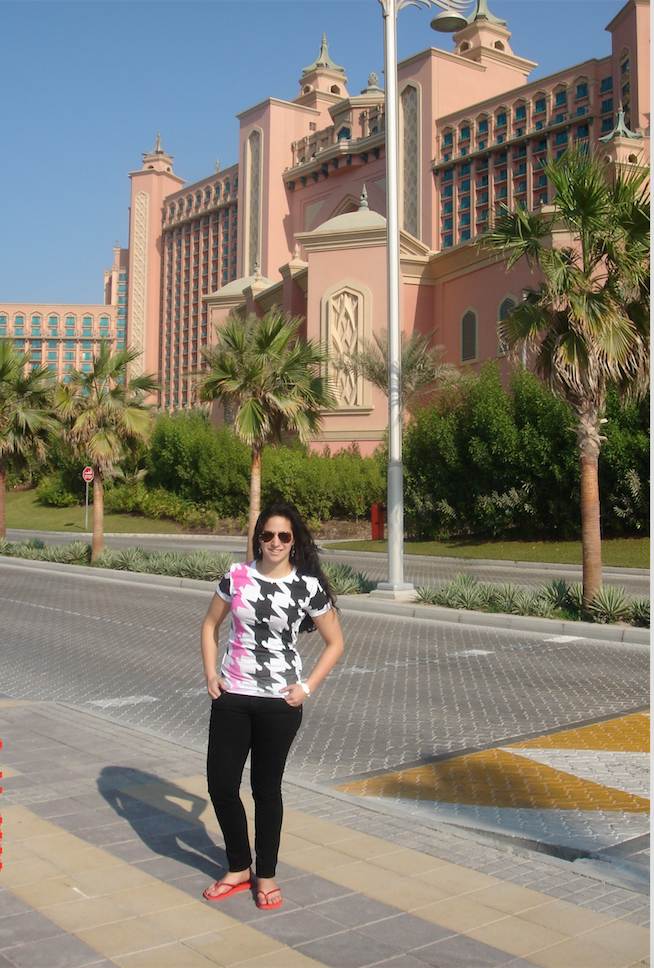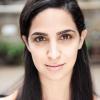
Sayde in front of the Atlantis Hotel on Palm Jumeirah.
I live in a country, the UAE, where women do not have to wear the veil. Some do anyway, because they genuinely like it.
As a modern Arab woman, I want people in the United States to know that the Arab world is changing, and cities in the Middle East look more like modern American cities every day. I had the opportunity to live and work in America, Europe and the Middle East and I want to take this opportunity to dispel some of the misconceptions I have encountered about being an Arab woman.
1. We are just like you.
We go to school and work. We crave the latest iPhone, dream of Mr. Right, love great clothes, have hobbies, and love buying shoes and watching trashy TV. We get our hair and nails done, we fall in love, get our hearts broken, want that promotion at work, like eating junk food, enjoy music, watch movies, enjoy walks on the beach . . . I could go on, but don’t forget our shared humanity. We are just like you. Although your news channel may only focus on the Middle East when there is some tragic incident, please don’t forget that most of us are just trying to live and let live whilst making ends meet.
2. Many Muslim women feel empowered by the veil, not subjugated.
In the West, I have often encountered the common misconception that Muslim women accept the veil like it’s some sort of collective Stockholm syndrome. I have spoken to a lot of folks, even the most educated and enlightened among us, who believe that Muslim women know they’re being subjugated and accept it. I have rarely encountered people who see it as most Muslim women see it — a positive. I live in a country, the UAE, where women do not have to wear the veil. Some do anyway, because they genuinely like it. Women here take pride in their Abayas: they are expensive pieces of clothing that can adapt to trends and patterns, and women spend a lot of time and money on these valued pieces of clothing.
3. Not all Arabs are Muslims.
Saying everyone in the Middle East is a Muslim is like saying everyone in America is a Christian. Stop it. The picture is far more complex. Just like there are different sects of Christianity, there are also different sects of Islam like Sunni, Shi’a, Ismailis and Ibadi to name but a few. From Druze, Orthodox Christianity, and Zoroastrian: the Middle East is as religiously diverse as Europe or America.
On a similar note, not all Muslims are Arabs. I remain staggered by how often I encounter the misconception that the Middle East is an ethnically homogenous mass. Many people from Turkey and Iran would be offended by being called Arab. I have met many Arabic-speaking, Muslim North Africans who identify as African rather than Arab — make no assumptions.
4. We are embarrassed and frightened by terrorism.
I have often come across the misconception where people think all Muslims are "ISIS lite." They believe that other Muslims are not as extreme, but are broadly sympathetic with terrorists like ISIS and the 9/11 bombers. I can assure you that this is deeply untrue. Every time I see that there has been a terrorist atrocity on the news, I pray that the perpetrator is not an Arab or someone with a Muslim name. I find it excruciating that people associate Arabs solely with terrorism. My generation may not realize that this is how the Irish were viewed from the '60s to the '90s, during the Troubles — the phenomenon of Muslim terrorism is more recent than many assume. The likelihood of an American teenager and an Arab teenager being radicalized is more similar than you may think.
Please don’t assume that the escalation of violence isn’t just as frightening to us. We are nearer in proximity to the affected regions, and as the Mosque bombings in Yemen this March and in Kuwait this June show, a supposedly shared religion means nothing to terrorists.
6. Arab culture is not necessarily Muslim culture.
The Middle East is a culturally diverse place. The food is great (it’s not just all chicken and rice!). The music and dance is soulful. The poetry and literature is romantic and moving. The art is colorful and beautiful. While many see all aspects of Arab life intertwined with Islam, you don’t have to be a Muslim to appreciate any of these aspects, which are cultural rather than religious.
7. The Middle East is a beautiful, fun place to live.
I am half Emirati and half English. I hold a European passport and I could happily live in Europe if I ever wanted to. I have, however, chosen to relocate back to Dubai, where I grew up. I feel as though the career opportunities for a recent graduate are far superior in Dubai than anywhere in Europe right now. I also feel that the quality of life here is much better than in London. I know that Dubai is unique in the Middle East, but the cities in Kuwait, Bahrain, Qatar, and Oman also offer unexpected opportunities as well. Since moving back to Dubai, I’ve found myself with more free time and more money to do my hobbies . . . and better weather to do them in.
So there you have it, folks! There are many Arab women like me, going about our day-to-day lives in the Middle East in a way the average American woman would find eerily similar. I know that there are a lot of political problems in the Middle East, and I don't ignore them. But since they get so much more airtime on the news than the good things happening here, I wanted people to be aware of the fuller picture. The truth is that we have more in common with the rest of the world than we have in difference.




